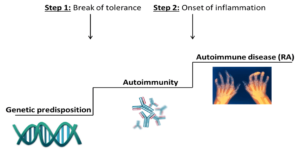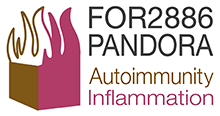Startseite
Rheumatoid arthritis (RA) is a common autoimmune disease characterized by a chronic inflammation of peripheral joints (arthritis). This inflammation causes swelling of the joints, pain and inflammatory-triggered degenerative changes in the joint structure. If persistent, the inflammation can result in systemic comorbidities, affecting, for example, the cardiovascular system or the bone. In recent years, research has focused on the later inflammatory stages of rheumatoid arthritis and studied mainly the signaling pathways contributing to the end-stage inflammation during this disease.

Our DFG research group FOR2886 aims to unravel the causes of RA and seeks to understand early events contributing to the onset of inflammation. The main focus here is to understand the influence of the natural bacterial flora or the microbiome as well as a number of environmental factors (including nutrition and salt consumption) on our immune system and in particular their impact on immune tolerance. In addition, we aim to address why a a subset of patients displaying a prototypic and RA-specific autoimmune response remain asymptomatic for years, while others suffer from an early and aggressive onset of disease. A better understanding of the causative molecular and cellular relationships would not only enable new, more effective and individualized therapeutic strategies, but above all, for the first time, open up options for curing this disease. Accordingly, we will conduct a first study applying a sequential combination of several therapeutic protein molecules (biologics) aiming to reprogram the (auto-)immune response in RA patients.







